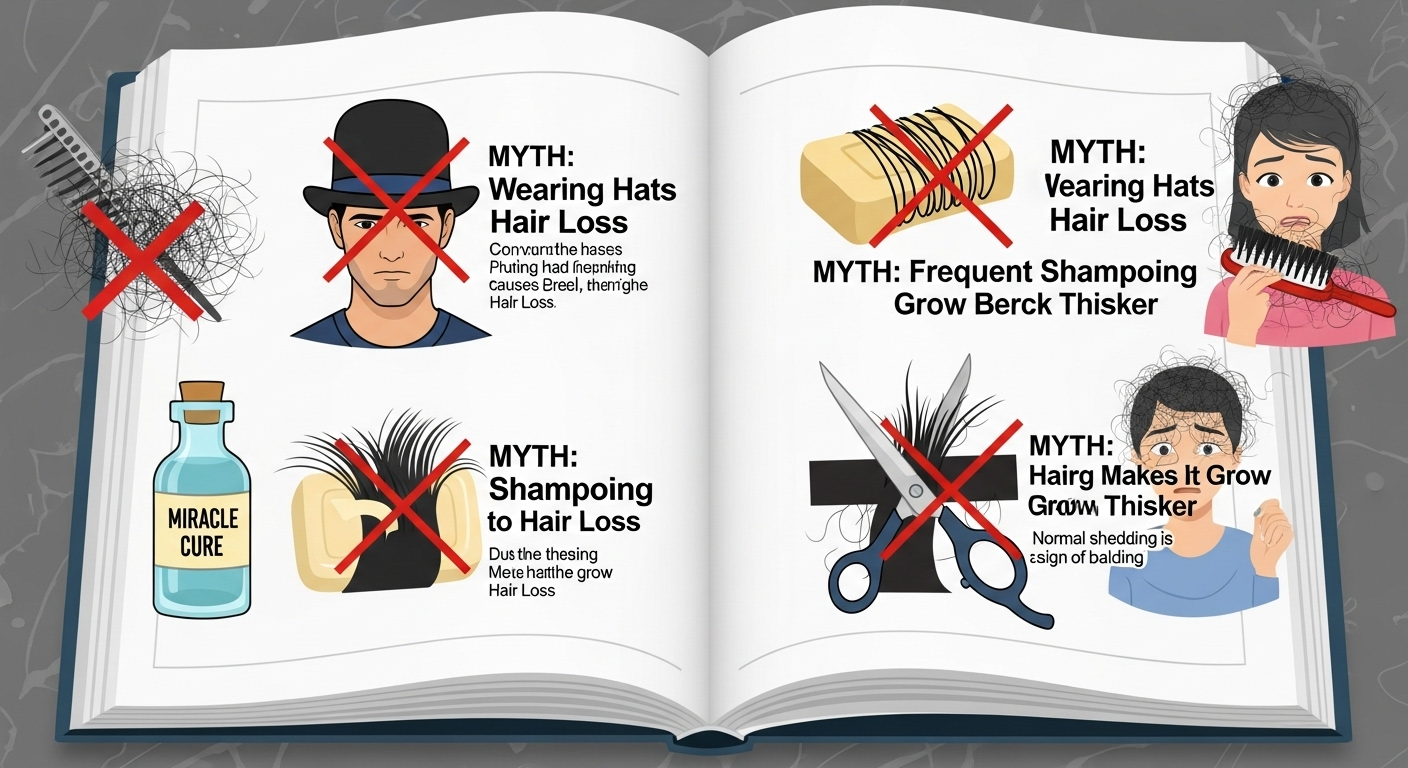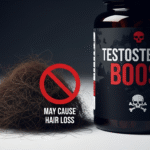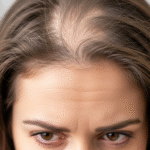Hair loss can be a distressing experience, and many people often turn to common myths and misconceptions in an attempt to understand or solve their hair issues. One of the most significant challenges is distinguishing between fact and fiction when it comes to hair loss. In this article, we will debunk the most common hair …
Hair loss can be a distressing experience, and many people often turn to common myths and misconceptions in an attempt to understand or solve their hair issues. One of the most significant challenges is distinguishing between fact and fiction when it comes to hair loss.
In this article, we will debunk the most common hair loss myths and uncover the truths that can help you make informed decisions about your hair health. By reading this post, you’ll learn the real causes of hair loss and the steps you can take to manage it effectively. Trust expert-backed insights to guide your hair care journey.
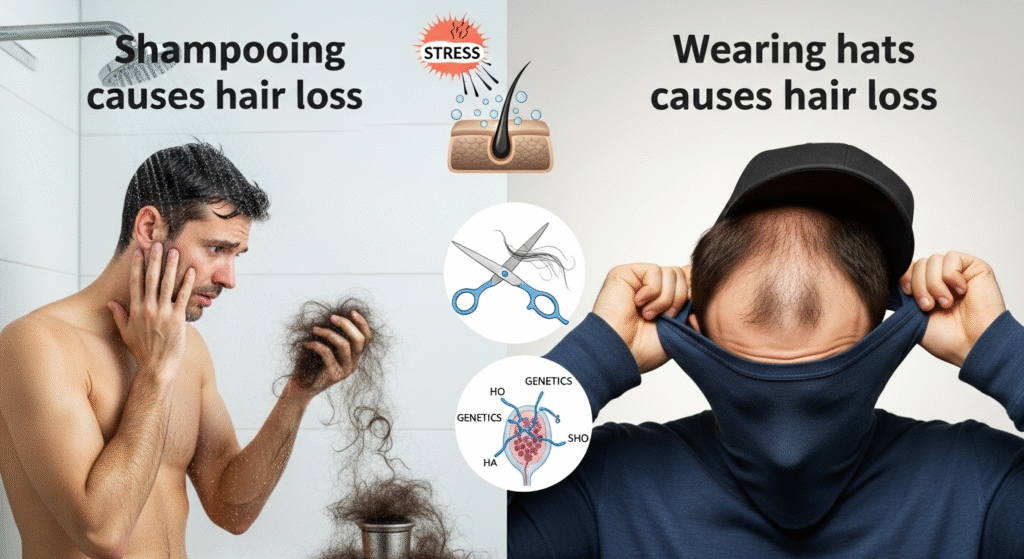
Common Hair Loss Myths Explained
Myth 1: Hair Loss is Only Inherited from Your Mother’s Side
Many people believe that if their mother’s side of the family has a history of hair loss, they are doomed to face the same fate. However, genetics play a role in hair loss from both parents, not just from the maternal side. The truth is, androgenetic alopecia (the most common form of hair loss) is influenced by multiple genes, many of which are inherited from the father.
- Scientific Fact: Studies show that the gene for hair loss can be inherited from both sides of the family. Therefore, your paternal grandfather’s hair status can also have a significant impact.
- Pro Tip: If you have family members on both sides who have experienced hair loss, be proactive in managing your hair health with proper diet, scalp care, and early treatment options.
Myth 2: Stress Is the Primary Cause of Hair Loss
While it’s true that stress can contribute to hair thinning, it is not the primary cause of hair loss for most individuals. Stress-related hair loss, known as telogen effluvium, is usually temporary and occurs after a stressful event, such as surgery, a traumatic event, or a major lifestyle change. In most cases, hair growth returns to normal after a few months once stress levels stabilize.
- Scientific Fact: Stress can push a large number of hair follicles into the shedding phase, but it typically doesn’t cause permanent hair loss unless there is an underlying condition.
Myth 3: Washing Your Hair Too Often Causes Hair Loss
Another common belief is that frequent hair washing leads to hair loss. In reality, washing your hair regularly doesn’t cause hair loss. In fact, keeping the scalp clean and free from oil and debris helps maintain healthy hair follicles.
- Scientific Fact: Hair loss is linked to factors such as genetics, hormones, and health conditions, not how often you shampoo.
- Pro Tip: If you have oily hair, feel free to wash it daily with a gentle shampoo. Avoid harsh, stripping products, and opt for mild shampoos that won’t damage the hair shaft.
Myth 4: Hair Loss Only Affects Men
Many people assume that hair loss is a male-only issue, but this is far from the truth. Women also experience hair loss, especially as they age. Female pattern baldness is a real condition that can occur due to hormonal imbalances, pregnancy, menopause, or other factors. In fact, women make up 40% of individuals who experience hair loss, according to the American Academy of Dermatology.
- Scientific Fact: Hormonal changes, including menopause and pregnancy, often trigger hair thinning in women.
- Expert Tip: Women who notice excessive hair thinning should consult with a dermatologist to rule out hormonal imbalances or other underlying conditions.
Myth 5: Wearing Hats or Tight Hairstyles Causes Hair Loss
Wearing hats or pulling your hair tightly into styles like ponytails and braids is often blamed for hair loss. While tight hairstyles can cause traction alopecia, a form of hair loss caused by physical stress on the hair follicles, hats do not cause permanent hair loss.
- Scientific Fact: Traction alopecia can be caused by tight hairstyles but is preventable by wearing looser styles and giving your hair breaks from tight pulling.
- Pro Tip: To avoid traction alopecia, try to wear your hair in loose, natural styles and avoid constantly wearing hats that might irritate the scalp.
What Really Causes Hair Loss?
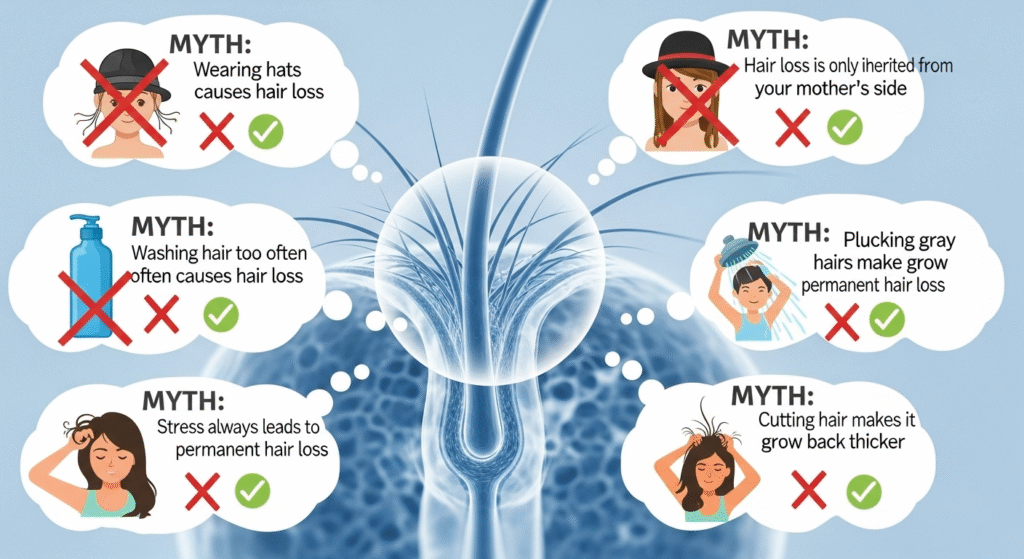
Genetics: The Leading Cause
Genetics are the most significant factor in androgenetic alopecia, which causes both male and female pattern baldness. In this condition, hair follicles gradually shrink, leading to thinner and shorter hair strands, eventually causing bald spots. Androgenetic alopecia is primarily driven by hormones like DHT (dihydrotestosterone), which is produced when testosterone breaks down.
- Scientific Fact: Male-pattern baldness is typically more aggressive, but women can also experience diffuse thinning, especially around the crown.
- Expert Insight: Genetic hair loss usually begins in the late 20s or early 30s, and it progresses gradually over time.
Hormonal Imbalances
Changes in hormones can have a significant impact on hair growth. Hormonal imbalances caused by pregnancy, menopause, thyroid problems, or polycystic ovary syndrome (PCOS) can lead to hair thinning or shedding.
- Scientific Fact: Thyroid issues are one of the most common causes of hair loss in both men and women, as thyroid hormones play a vital role in the hair growth cycle.
- Expert Tip: If you experience unexplained hair thinning, consult with a healthcare provider to test for underlying hormonal imbalances.
Nutritional Deficiencies
Your hair needs proper nutrition to stay healthy. Deficiencies in essential nutrients such as iron, vitamin D, zinc, and biotin can lead to hair thinning or shedding. A poor diet can result in the hair growth cycle being disrupted, leading to temporary hair loss.
- Scientific Fact: A deficiency in iron or vitamin D can result in hair loss, which is typically reversible with proper supplementation.
- Pro Tip: Eating a balanced diet rich in vitamins and minerals can promote healthy hair growth and prevent nutritional deficiencies from affecting your scalp.
Health Conditions
Certain health conditions like alopecia areata, scalp infections, and autoimmune diseases can lead to hair loss. In some cases, hair loss may be a symptom of an underlying medical issue.
- Scientific Fact: Alopecia areata causes hair loss in small, round patches on the scalp, while other autoimmune diseases like lupus can also result in thinning or patchy hair.
- Expert Insight: If you notice sudden hair loss or patches of missing hair, it’s important to consult with a dermatologist to determine the cause.
How to Manage Hair Loss and Avoid Common Mistakes
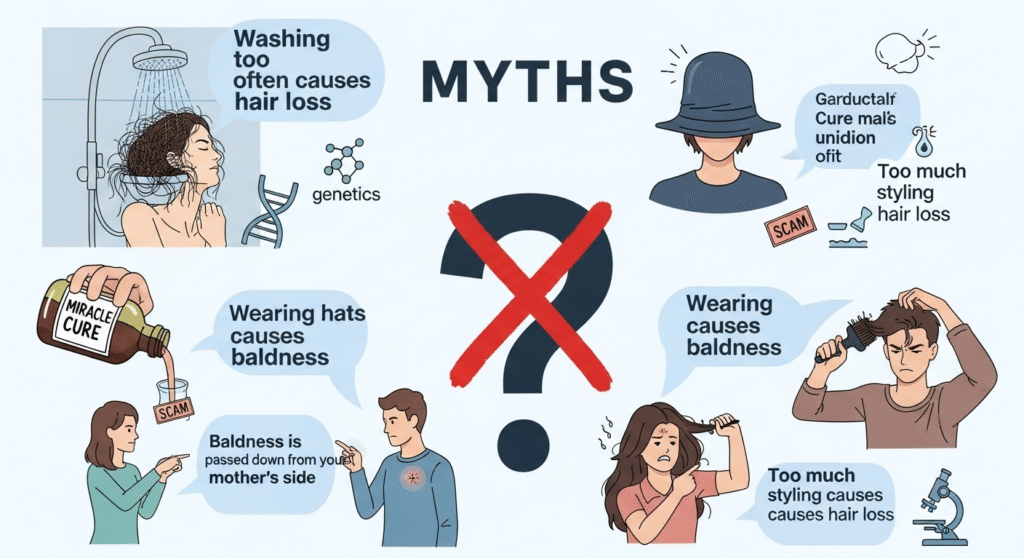
Avoiding Fad Treatments
When it comes to hair loss, fad treatments and miracle cures often promise quick fixes but rarely deliver. Medically approved treatments, such as minoxidil (Rogaine) and finasteride (Propecia), are the most effective methods for treating hair loss.
- Pro Tip: If you’re using a hair loss treatment, be patient. These treatments typically take several months to show visible results.
Consulting a Specialist
If you’re concerned about hair loss, the best course of action is to consult a dermatologist or a hair restoration specialist. They can help diagnose the underlying cause of your hair thinning and create a personalized treatment plan.
- Expert Tip: Seeing a professional early can prevent further hair loss and increase your chances of reversing or slowing down the process.
Lifestyle Changes That Support Hair Health
Adopting a healthy lifestyle can go a long way in managing hair loss. Regular exercise, a balanced diet, stress management, and proper hair care routines can all contribute to healthy hair growth.
- Pro Tip: Avoid excessive heat styling, harsh chemicals, and tight hairstyles that may damage your hair.
FAQs
Can hair loss be reversed?
In many cases, yes, especially when it’s caused by stress or nutritional deficiencies. Medical treatments like minoxidil can help, but it’s essential to act early.
Do supplements really help with hair regrowth?
Some supplements, such as biotin and zinc, can support hair health, but they are not miracle cures for hair loss. Always consult with a healthcare provider before starting any supplements.
Is it too late to start treatment if I’ve been losing hair for years?
It’s never too late to start treatment, but earlier intervention typically leads to better outcomes. A dermatologist can evaluate your condition and recommend appropriate treatments.
Conclusion: Busting Hair Loss Myths for Good
In conclusion, hair loss myths can often lead people down the wrong path when it comes to treatment and prevention. By understanding the truth behind these myths and recognizing the real causes of hair loss, you can take informed steps toward maintaining healthy hair. Whether you’re dealing with genetics, hormonal changes, or nutritional deficiencies, professional guidance and proper treatments are key to managing hair loss effectively.
If you’re struggling with hair loss and want personalized guidance, book a consultation with Dr. Uzma Irfan, an ISHRS-certified surgeon in Islamabad today. Get expert advice and the best treatment options to help you regain a full, healthy head of hair.

